Gretna Green: The bit of Scotland where English people go to get married
- Published
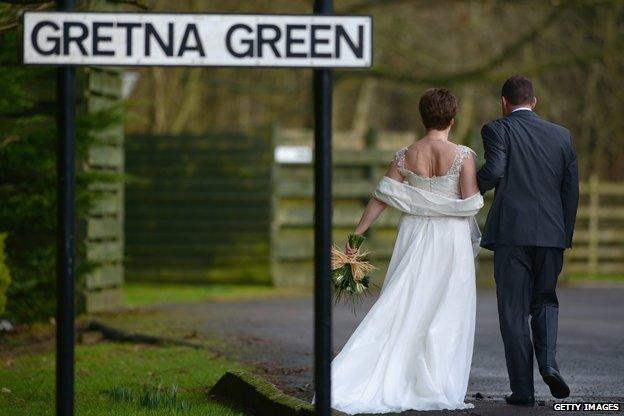
Gretna Green has been a hotspot for tying the knot since the 18th Century. But why do people still choose to walk down its many aisles?
The Scottish village of Gretna Green - population 2,700 - hosts almost two weddings per person per year.
The estimated 5,000 marriages, external that take place every year seem extraordinary if you consider that a mere 3,000 weddings, external took place across the entire county of neighbouring Cumbria - population 500,000 - in 2011.
Gretna's status as the ultimate wedding destination comes from its position just north of the Scottish border.
In 1754, an English law stopped couples under 21 marrying without their parents' permission. But in Scotland it was permitted for girls from the age of 12, and for boys aged 14 or older. Moreover, anyone in Scotland could marry a couple by "declaration".
Young star-crossed lovers in England would elope and Gretna was the first town they would come to, two miles over the border. Enterprising blacksmiths set themselves up as "anvil priests", carrying out the ceremony in return for a drink or a few guineas. One blacksmith wrote to the Times in 1843, specifying that he alone had performed around 3,500 marriages in the town over 25 years.
Several attempts were made to curb the phenomenon - which one MP for Newcastle described in 1855 as "lowering the habits, injuring the character, and destroying the morality of the people of the northern counties of England". A year later an act was introduced to require a "cooling-off period" of 21 days' residency in the parish in which a couple wished to marry.
In 1940 the institution of "marriage by declaration" was outlawed in Scotland and in 1977 English couples could finally get married without parental consent at 18.
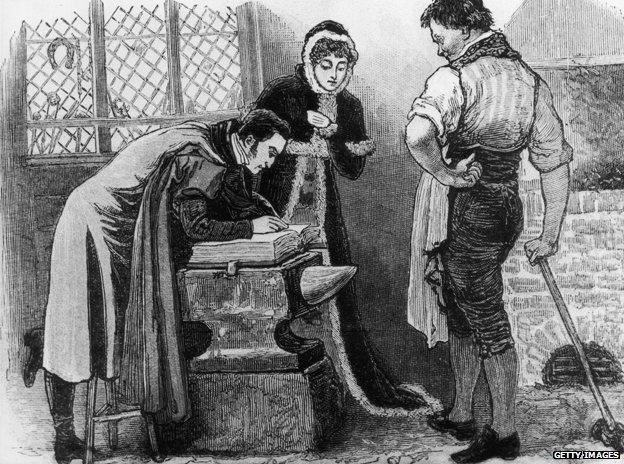
An eloping couple (circa 1850) marry in the blacksmith's shop at Gretna Green
There is still a small Gretna "gap" in the two legal systems. Marriage is legal at 16 in Scotland without parental consent. It's still 18 in England and Wales. Although 15 days' notice is currently required to marry in Scotland, there is no residency requirement, meaning English couples can still get married there at relatively short notice.
But despite the whittling away of the legal distinction that made Gretna a marriage capital, it retains a romantic allure. "Running away to Gretna Green" remains a commonly used phrase. And couples still come.
They just don't tend to be teenagers these days.
An entire industry has built up around the tradition in Gretna Green, with multiple hotels, wedding planning companies, car hire firms, photographers, gift shops and hair salons conspicuous in a town that is not even big enough to have a supermarket.
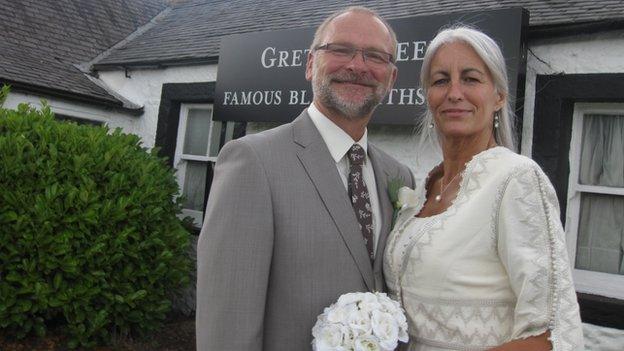
Adie and Sarah Miles - eloping from Bognor Regis
Adie and Sarah Miles, 52 and 49, are having their picture taken outside a venue called The Famous Blacksmith Shop. They have "eloped" from Bognor Regis on the English south coast without telling their family and plan to surprise them on their return. "We've both been married before and we didn't want any fuss. We chose Gretna because of the romance and the history - this place where so many people have eloped over the years."
The words "history" and "romance" are endlessly bandied about in Gretna. Ailsa Taylor, who runs The Wedding Warehouse bridalwear shop over the border in Carlisle deals with a steady stream of couples on their way north. "A lot" of the brides have made their choice "because of the history and romantic connotations".
Like the 24-hour wedding chapels of Las Vegas, the commercial element of a Gretna wedding is not to everyone's taste. "It can be seen as a bit of a sausage factory - with couples whisked in and out in 15 minutes," the shopkeeper says. "It's one of those love or hate things. Either you love all the tradition and the fanfare or you see it as a bit tacky."
The Mill Forge Hotel in Gretna sees around 600 weddings a year, of which 80% are English couples. "You do still get people eloping occasionally but it's less common than it used to be," says manager Graham Smith. "It's more about the long history of weddings here, that's why people want to come here. Our main customer base is from Manchester, Liverpool, Yorkshire, down to Birmingham but also from much further afield - we've had wedding parties from South Africa, Uruguay, Chile, the States and New Zealand."

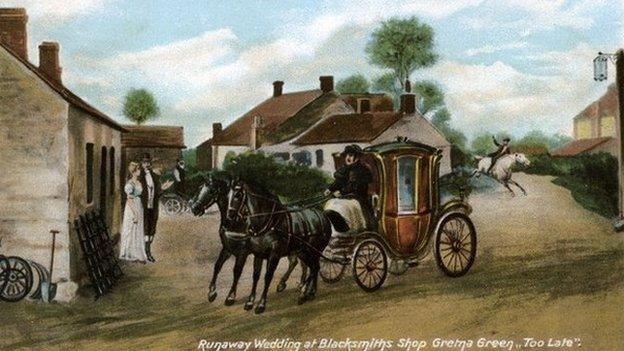
Weddings and the law
1754: Lord Hardwicke's Marriage Act introduces a minimum marital age of 21 without parental consent in England but the law does not apply in Scotland
1856: Lord Brougham's Act, sometimes known as "the cooling-off act" stipulates a three-week residency in Scotland prior to the marriage for at least one half of a marrying couple for the marriage to be legal
1929: Minimum age for marriage throughout Britain is set at 16, but in England parental consent is still required under 21 and not in Scotland
1940: Marriage by declaration - where anyone could perform a ceremony - is outlawed in Scotland. Weddings can only occur in either a church or registry office but informal blessings "over the anvil" become a popular complement
1977: The marriage age in England without parental consent drops to 18, Lord Brougham's Act is repealed and religious weddings can happen outside a Scottish church
2002: In Scotland civil weddings are allowed outside a registry office in "approved" premises

Gretna is a curious crucible for the independence debate. It has always traded on its difference from England, but has businesses that rely utterly on cross-border trade.
Asked if he thinks Scottish independence will have an impact on his business, the Mill Forge manager has mixed feelings: "As a Scot, my heart tells me that's what I want. My head says, 'how's it going to work?'."
There is no such equivocation for Alasdair Houston. He is the chairman of Gretna Green Ltd - a wedding empire in the town, including a hotel, a museum, a gift shop, food hall and even a "courtship maze".
The company owns the The Famous Blacksmith's Shop - a building dating back to the early 1700s. The shop hosted 1,500 weddings last year. The majority were English.
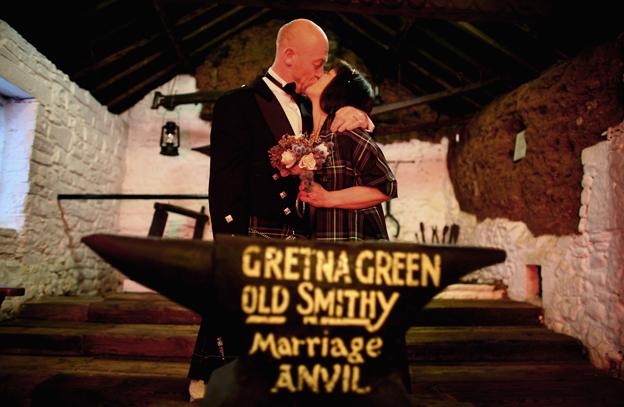
The Famous Blacksmith's Shop hosted 1,500 weddings last year
The chairman gained a measure of prominence earlier this year when he donated £10,000 to the Better Together campaign.
"We don't do divorce at Gretna Green, it's not what we're famous for," he quips. "We [Scotland and England] are a partnership, we may have squabbles from time to time. But to go from that to saying 'full divorce please' would be utter madness."


A referendum on whether Scotland should become independent is to take place
People resident in Scotland will be able to take part in the vote, answering the "yes/no" question: "Should Scotland be an independent country?"
The referendum will take place on Thursday 18 September 2014
Go to the BBC's Scotland Decides page for analysis, background and explainers on the independence debate.

He goes on to set out a few examples of the "nuisance" it could cause. "We could have half of my staff living in this country called England and half on this side, being paid in different currency, on different tax rates. Potentially, customers would have to adjust their clocks for a different time of day for their appointment in Scotland and potentially having to cross the border for the last drink."
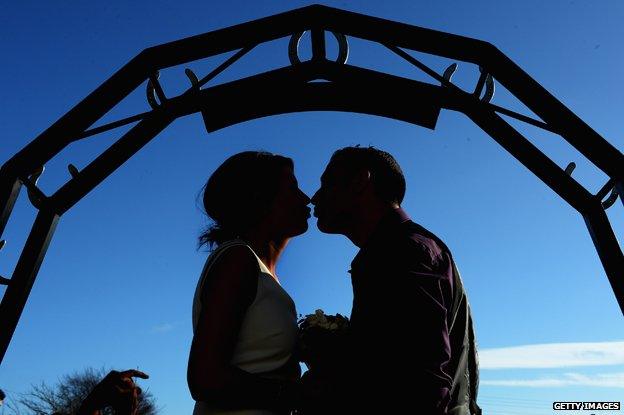
But other entrepreneurs seem sceptical of the vote's impact on Gretna. Linda Bell runs Sweetheart Cakes in nearby Dumfries and caters for many weddings in Gretna.
"Independence won't have a knock-on effect. If people want to get married in Gretna they will do it regardless."
Subscribe to the BBC News Magazine's email newsletter to get articles sent to your inbox.